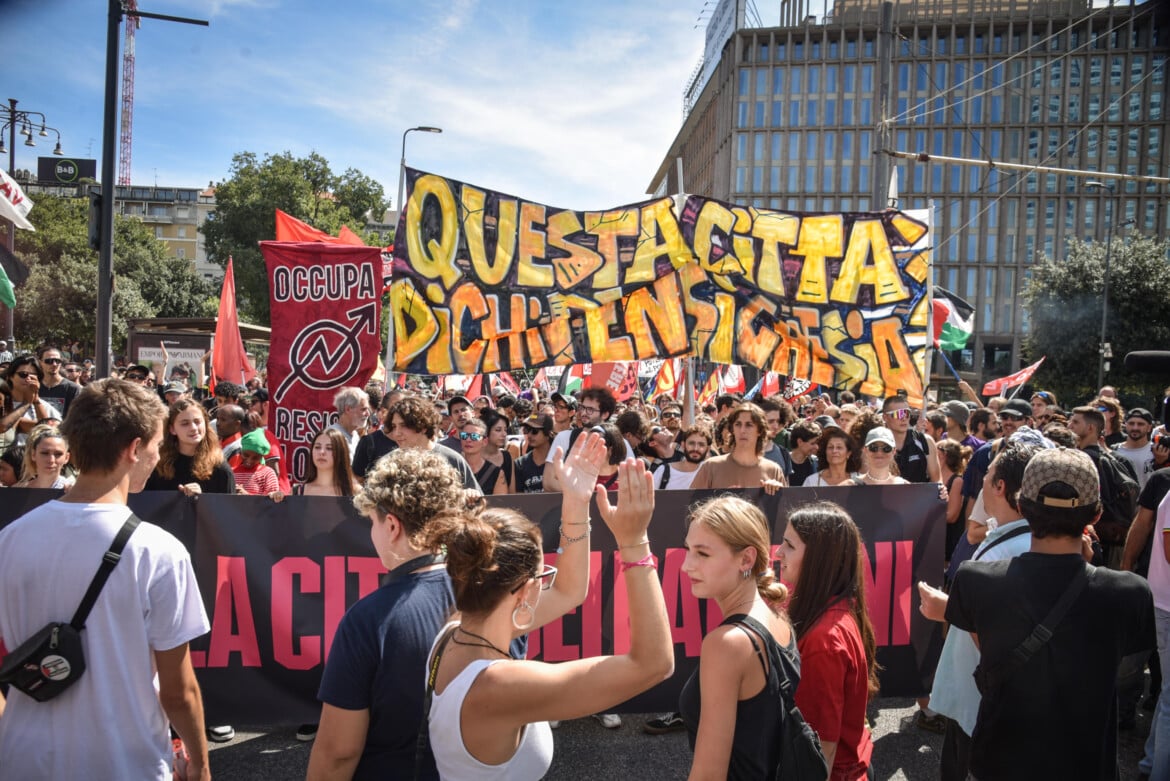Reportage
Milan turns Leoncavallo from doomed squat to symbol of resistance
50,000 in the streets. When the demonstration unexpectedly managed to fill up the Piazza Duomo, the city's central square, it became clear that the nomadic Leoncavallo had truly taken the city.

Saturday’s march was not a funeral for Leoncavallo; on the contrary, it was a demonstration of vitality and power.
The streets were filled not only with those who want to defend the historic social center or who identify with its long and complex half-century history. It was filled with everyone who considers the attack on Leoncavallo, Milan's oldest and most famous counter-cultural squat, a threat to themselves, their political experiences, their ways of life, and the very possibility of imagining an existence as far as possible from misery and loneliness. The large numbers show that this category includes a great many people of different generations, cultures, and even social classes.
The day began early, when a few hundred activists from Milan’s social spaces, some very young, appeared in front of Leoncavallo’s now-former headquarters on Via Watteau. This was the location evicted on August 21, and it remains under constant surveillance by numerous police officers.
It’s a safe bet that this permanent police presence will last for a while, not least because within the walls of “the Leo,” as it is known, there are works of art and historical documents protected by Italy's cultural heritage authority. It will be difficult for them to hastily call in the bulldozers to make way for new high-rises in the courtyard.
The day continued with a midday aperitif, with a meeting point in front of Milan’s Central Station – one of the “red zones” where the poor have the fewest rights, as designated by this government’s regulations. From here, the social centers marched independently toward the affluent City Life district. They were joined by the Network of Metropolitan City Committees, which has long denounced the reckless construction projects of Milan’s urban regeneration. “Squatting has never taken anything from anyone,” they called out from a truck. “But it has given a lot to those who had no space or roof over their heads. The only ones who lose out are the speculators.” They continued: “Leoncavallo is a symbol, but we have no use for empty symbols. That’s why it needs to remain a symbol of resistance.” The procession passed in front of the Pirellino, one of the city’s unfinished skyscrapers.
When the red cloud of smoke bombs rose, this was the signal: the gate surrounding the construction site of the project – one of those pushed by real estate developer Manfredi Catella, halted by an investigation into real estate speculation – was breached.
“How many zeros do our salaries need to have so we could live in these skeletons of concrete and glass?” someone shouted through a megaphone. A giant sign advertising a finance company right next to the new towers reads “Change is good.” It was completely covered by a large banner reading “Against the city of the big bosses.”
The feeder march gradually swelled until it reached the official starting point at Porta Venezia. Here, the demonstration became massive, surpassing even the most optimistic predictions. The announcement from the procession’s lead truck was cautious, yet enthusiastic, with a typical sort of Milanese restraint: “There are more than 50,000 of us!”
There was a tractor from the winemakers of La Terra Trema – a food and wine festival often hosted by Leoncavallo – distributing red wine and good vibes. A group of well-known Italian actors, including Paolo Rossi and Claudio Bisio, carried a “comedians” banner in memory of their rehearsals on the Leo’s stage. Representatives from ANCI and ARPI were there, as were politicians from the PD and the Greens and Left Alliance (AVS).
“Right now, the party has a duty to provide answers to what this protest is asking, and we think there is nothing embarrassing and no contradiction in us being here,” said the PD’s Milanese secretary, Alessandro Capelli. Social centers from the northeast of Italy and from Bologna and the Emilia-Romagna region were also present.
Many came from Brescia and Bergamo, cities in the Lombardy heartland where the social left and grassroots movements have long been fighting inch by inch to stop the reactionary tide. Hundreds of activists from Rome were also scattered throughout the march. The banner of Forte Prenestino, Europe’s largest social center, based in Rome, was a small masterpiece of irony and myth-making, citing the historic slogan from Leoncavallo’s 1989 eviction in Latin: “Ubi necesse est necesse est” (Where it is necessary, it is necessary).
And when the demonstration unexpectedly managed to fill up the Piazza Duomo, the city's central square, it became clear that the nomadic Leoncavallo had truly taken the city. There is a time for urgency, for swift action in the face of the unexpected, but there is also a time for nurturing relationships and caring for future generations. The march sought to express both impulses: “Milan, unsheathe your claws and defend your social spaces,” came the call from the lead truck. “We were here long before you came to power in the city and the country, and we will still be here when you have all gone home.”
It is by no means a given that all this represents a new form of grassroots alliance, an ecumenical umbrella under which a unified movement can be reborn. However, it is certainly a political achievement that the patient groundwork of recent days brought all these people together, largely in mutual recognition of each other’s legitimacy. And it allows one to think, at least for a day, that this is the real “Milan model”: the horizontal city versus the vertical one.
Originally published at https://ilmanifesto.it/leoncavallo-il-bosco-orizzontale-di-milano on 2025-09-07
